英语作文西方节日和中国传统节日
中国传统节目英语作文范文示例
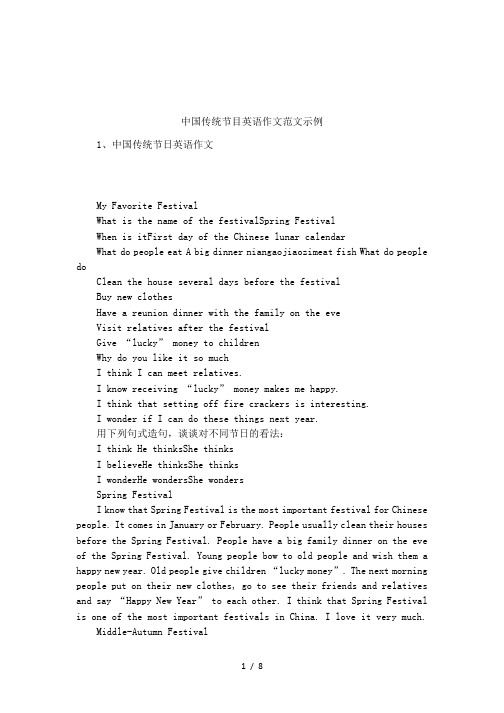
中国传统节目英语作文范文示例 1、中国传统节日英语作文My Favorite Festival What is the name of the festivalSpring Festival When is itFirst day of the Chinese lunar calendar What do people eat A big dinner niangaojiaozimeat fish What do people do Clean the house several days before the festival Buy new clothes Have a reunion dinner with the family on the eve Visit relatives after the festival Give “lucky” money to children Why do you like it so much I think I can meet relatives. I know receiving “lucky” money makes me happy. I think that setting off fire crackers is interesting. I wonder if I can do these things next year. 用下列句式造句,谈谈对不同节日的看法: I think He thinksShe thinks I believeHe thinksShe thinks I wonderHe wondersShe wonders Spring Festival I know that Spring Festival is the most important festival for Chinese people. It comes in January or February. People usually clean their houses before the Spring Festival. People have a big family dinner on the eve of the Spring Festival. Young people bow to old people and wish them a happy new year. Old people give children “lucky money”. The next morning people put on their new clothes, go to see their friends and relatives and say “Happy New Year” to each other. I think that Spring Festival is one of the most important festivals in China. I love it very much. Middle-Autumn Festival1/8People believe that the Middle-Autumn Festival is one of the most traditional Chinese festivals, it is often celebrated in September or October. During the festival, family members get together and eat moon cakes. There are many kinds of delicious moon cakes. I think they are very delicious. On the evening of the Middle-Autumn Festival, people can enjoy the full moon in the dark sky. I like Mid-Autumn Festival because it makes me happy. Dragon Boat Festival The D ragon Boat Festival is a traditional festival in China. There’s a folk story about this festival. Many years ago, There was a poet called Qu Yuan. He loved his country very much. However, the king asked him to leave the country. He felt very sad. When he learned that another country had seized his country, he didn’t want to live any more.On the fifth day of the fifth lunar month, he jumped into Miluo River. The local people rowed the boat to save him, but it was too late. They didn’t want the fish to eat his body, So they dropped rice balls into the river. Nowadays, on this day, we watch dragon boat races and eat ZONGZI in memory of Qu Yuan. 2、西方的主要节日 Festivals in the West 大学英语作文 西方的主要节日 Festivals in the West 大学英语作文 Christmas comes on December 25th. It’s the most important festival of the year in the western world. At Christmas time, schools, shops and offices close for holiday period, so people can spend time at home with their families. Nowadays, Christmas is celebrated by westerners and Americans by sending gifts and Christmas cards, preparing delicious food, and decorating homes with colorful lights and Christmas trees. 圣诞节在十二月二十五日。
中外节日异同英语作文
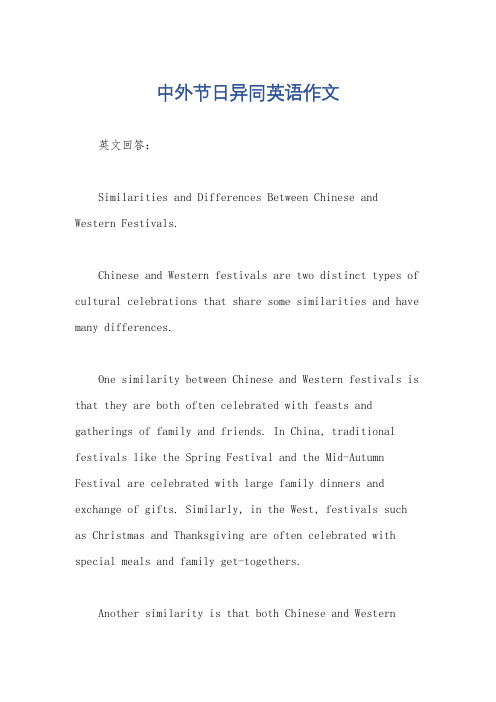
中外节日异同英语作文英文回答:Similarities and Differences Between Chinese and Western Festivals.Chinese and Western festivals are two distinct types of cultural celebrations that share some similarities and have many differences.One similarity between Chinese and Western festivals is that they are both often celebrated with feasts and gatherings of family and friends. In China, traditional festivals like the Spring Festival and the Mid-Autumn Festival are celebrated with large family dinners and exchange of gifts. Similarly, in the West, festivals such as Christmas and Thanksgiving are often celebrated with special meals and family get-togethers.Another similarity is that both Chinese and Westernfestivals often involve traditional music and dance. In China, traditional festivals are often accompanied bylively lion dances, dragon dances, and opera performances. In the West, festivals like Christmas and Easter often feature carols, hymns, and traditional folk dances.However, there are also many differences between Chinese and Western festivals. One of the most significant differences is the timing of the festivals. Chinese festivals are often based on the lunar calendar, while Western festivals follow the solar calendar. This meansthat the dates of Chinese festivals change from year to year, while the dates of Western festivals remain the same.Another difference is the purpose or significance of the festivals. Chinese festivals are often rooted in Chinese history, mythology, and religious beliefs. For example, the Spring Festival celebrates the beginning of the new year according to the lunar calendar, while theMid-Autumn Festival celebrates the harvest and the moon. In contrast, Western festivals are often based on Christian or other religious beliefs. For example, Christmas celebratesthe birth of Jesus Christ, while Easter celebrates his resurrection.Finally, there are differences in the way that Chinese and Western festivals are celebrated. Chinese festivals are often celebrated publicly with large-scale events and displays. For example, the Spring Festival is celebrated with fireworks, parades, and traditional performances. In contrast, Western festivals are often celebrated privately within families and communities. For example, Christmas is often celebrated with a family gathering around a decorated Christmas tree.中文回答:中国和西方节日异同。
中西方节日对比英语作文简单

中西方节日对比英语作文简单中文回答:中西方节日对比。
中文回答:我将比较中西方的节日,探讨他们的相似之处和不同之处。
中文的节日有春节、清明节、端午节、中秋节等等,而西方的节日有圣诞节、复活节、感恩节等等。
英文回答:When it comes to comparing Chinese and Western festivals, there are both similarities and differences to consider. In China, we celebrate festivals such as the Spring Festival, Qingming Festival, Dragon Boat Festival, and Mid-Autumn Festival, while Western countries have holidays like Christmas, Easter, and Thanksgiving.中文回答:首先,中西方节日都是为了庆祝特定的事件或传统。
例如,春节是中国最重要的节日之一,它庆祝新年的开始,家人团聚,互赠红包和祝福。
类似地,圣诞节是西方国家最重要的节日之一,庆祝耶稣的诞生,人们会装饰圣诞树,交换礼物,与家人和朋友共度时光。
英文回答:Firstly, both Chinese and Western festivals are celebrated to mark specific events or traditions. For example, the Spring Festival is one of the most important festivals in China, celebrating the start of the new year with family reunions, red envelopes, and well wishes. Similarly, Christmas is one of the most significant holidays in Western countries, commemorating the birth of Jesus with the decoration of Christmas trees, exchanging gifts, and spending time with family and friends.中文回答:其次,中西方节日都有特定的食物和饮品与之相关联。
英语作文:中西方传统节日文化的碰撞
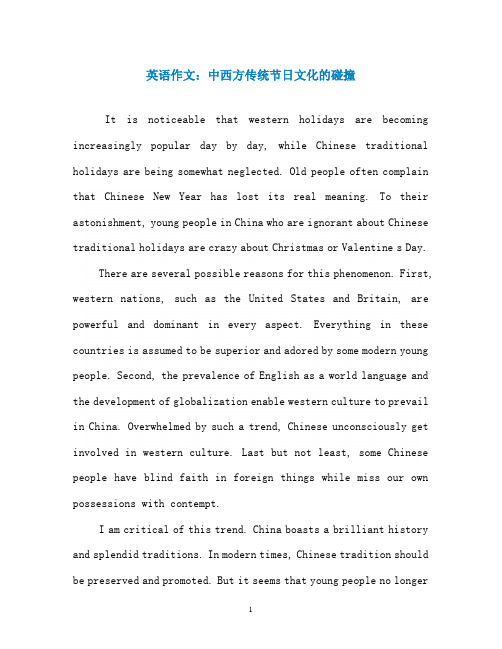
英语作文:中西方传统节日文化的碰撞It is noticeable that western holidays are becoming increasingly popular day by day, while Chinese traditional holidays are being somewhat neglected. Old people often complain that Chinese New Year has lost its real meaning. To their astonishment, young people in China who are ignorant about Chinese traditional holidays are crazy about Christmas or Valentine s Day.There are several possible reasons for this phenomenon. First, western nations, such as the United States and Britain, are powerful and dominant in every aspect. Everything in these countries is assumed to be superior and adored by some modern young people. Second, the prevalence of English as a world language and the development of globalization enable western culture to prevail in China. Overwhelmed by such a trend, Chinese unconsciously get involved in western culture. Last but not least, some Chinese people have blind faith in foreign things while miss our own possessions with contempt.I am critical of this trend. China boasts a brilliant history and splendid traditions. In modern times, Chinese tradition should be preserved and promoted. But it seems that young people no longertreasure the traditions. On the contrary, they turn to pursue enthusiastically a supposedly more modern culture. If this trend is allowed to continue, the priceless heritage of our ancestors will be replaced by western traditions. Nobody expects such a consequence. So let s join hand in hand to protect Chinese tradition, especially traditional holidays.。
中西方传统节日保持平衡英语作文80词
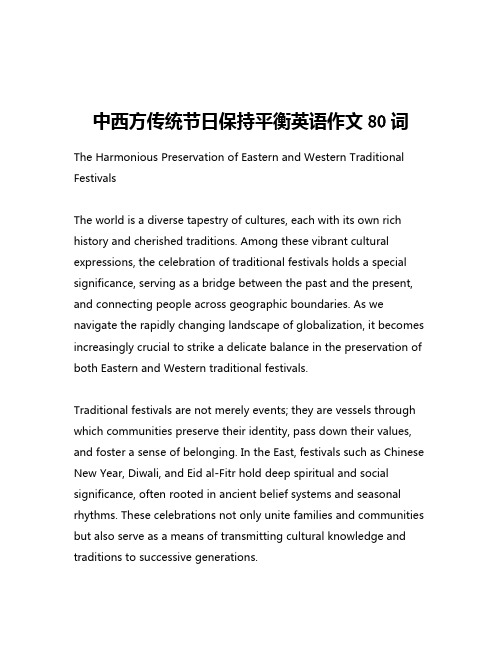
中西方传统节日保持平衡英语作文80词The Harmonious Preservation of Eastern and Western Traditional FestivalsThe world is a diverse tapestry of cultures, each with its own rich history and cherished traditions. Among these vibrant cultural expressions, the celebration of traditional festivals holds a special significance, serving as a bridge between the past and the present, and connecting people across geographic boundaries. As we navigate the rapidly changing landscape of globalization, it becomes increasingly crucial to strike a delicate balance in the preservation of both Eastern and Western traditional festivals.Traditional festivals are not merely events; they are vessels through which communities preserve their identity, pass down their values, and foster a sense of belonging. In the East, festivals such as Chinese New Year, Diwali, and Eid al-Fitr hold deep spiritual and social significance, often rooted in ancient belief systems and seasonal rhythms. These celebrations not only unite families and communities but also serve as a means of transmitting cultural knowledge and traditions to successive generations.Similarly, in the West, festivals like Christmas, Thanksgiving, and Halloween have become integral parts of the cultural fabric, each with its unique customs, symbols, and rituals. These festivals not only bring joy and merriment but also provide opportunities for people to come together, celebrate shared values, and strengthen social bonds.As globalization accelerates the exchange of ideas, goods, and people across borders, the need to maintain a balance between preserving traditional festivals and adapting to changing times becomes increasingly apparent. On the one hand, the exposure to diverse cultural traditions can enrich and expand our understanding of the world, leading to greater appreciation and cross-cultural exchange. This can be seen in the growing popularity of Eastern festivals in the West and the increasing awareness of Western festivals in the East.On the other hand, the risk of cultural homogenization and the dilution of traditional values looms large. The commercialization and commodification of festivals, the influence of media and technology, and the pressure to conform to global trends can all contribute to the erosion of the authentic and meaningful aspects of traditional celebrations.To strike a harmonious balance, it is essential to adopt a multifaceted approach that combines the preservation of traditional practices withthe integration of contemporary elements. This can be achieved through several strategies:1. Educating and engaging the younger generations: Ensuring that traditional festivals are not just observed but also understood, appreciated, and actively participated in by the youth is crucial for their long-term preservation. This can be accomplished through school programs, family traditions, and community-based initiatives that foster a deep connection with cultural heritage.2. Adapting traditions to modern contexts: While maintaining the core essence of traditional festivals, it is necessary to adapt certain aspects to reflect the changing social, economic, and technological landscape. This could involve incorporating new elements that resonate with the current generation, while still preserving the fundamental traditions.3. Promoting cross-cultural exchange and understanding: Encouraging open dialogues, cultural festivals, and educational initiatives that facilitate the mutual understanding and appreciation of Eastern and Western traditional celebrations can help bridge the gap between diverse cultures and promote a more inclusive and harmonious global community.4. Protecting and revitalizing intangible cultural heritage:Governments, cultural institutions, and local communities should work together to safeguard the intangible aspects of traditional festivals, such as rituals, music, dance, and culinary traditions, ensuring their continuity and vitality.5. Fostering sustainable and eco-friendly practices: As we strive to preserve traditional festivals, it is crucial to consider the environmental impact of our celebrations and adopt sustainable practices that minimize waste, conserve resources, and promote environmental stewardship.By embracing these strategies, we can achieve a delicate balance in the preservation of Eastern and Western traditional festivals, ensuring that these cherished cultural legacies continue to thrive and inspire future generations. In doing so, we not only honor our past but also pave the way for a future where diverse cultures coexist in harmony, enriching the human experience and fostering a deeper understanding of our shared humanity.。
对传统节日和西方节日的看法 英语作文

对传统节日和西方节日的看法英语作文全文共6篇示例,供读者参考篇1Holidays are the Best! Views on Traditional and Western CelebrationsHolidays are awesome! I love holidays because they mean no school, staying up late, eating yummy food, and getting presents sometimes. There are so many fun holidays throughout the year to look forward to.In my family, we celebrate a mix of traditional Chinese holidays and Western holidays. The traditional holidays connect me to my culture and ancestors. The Western ones are fun too though, especially the ones with Santa Claus!One of my favorite traditional holidays is Chinese New Year. I love the red decorations, firecrackers, lion dances, and getting lucky money in red envelopes from my relatives. My parents always remind me the traditions represent good luck, prosperity, and honoring our family. I enjoy helping my mom make dumplings and other special foods for our New Year's Eve feast.After Chinese New Year, the next big traditional holiday is the Qingming Festival in early April. We visit the graves of our ancestors and clean them up. It helps me remember mygreat-grandparents who I never met. My dad buys food offerings like fruits and burns fake paper money and other goods so our ancestors receive them in the afterlife. It seems kind of weird, but it's an important ritual.In May or June, we celebrate the Dragon Boat Festival by eating sticky rice dumplings called zongzi. The shapes look like little pyramids or missiles! There are competitions of dragon boat racing too, which is basically a long canoe with a dragon head at the front. My uncle's team wins trophies nearly every year.The Mid-Autumn Festival in September is another big one. We eat mooncakes, which are thick pastries stuffed with lotus seed paste or other fillings. I like the ones with salted egg yolk centers the best! We also put lanterns outside to appreciate the bright harvest moon. My brother and I used to light littlehand-held lanterns and carry them around the neighborhood.Aside from those major holidays, there are other smaller traditional festivals too, like the Lantern Festival, Qixi Festival (Chinese Valentine's Day), and the Winter Solstice festival. Somany excuses for feasting on delicious foods and days off from school!As for Western holidays, Christmas is probably my favorite overall. I love the twinkling lights, colorful ornaments, Christmas trees, and receiving presents from Santa Claus. My friends and I have so much fun drafting up lists of toys we hope Santa brings. We leave out milk and cookies for him on Christmas Eve too.Surprisingly, my parents are fans of Halloween, even though it's an American holiday that we don't traditionally celebrate. They think it's fun for me and my brother to dress up in costumes. We go trick-or-treating around the neighborhood and come home with huge plastic pumpkins filled with candy. Last year, I was a zombie pirate while my brother was a mad scientist.Thanksgiving is another Western holiday we partake in because my parents think it's good to have a day focused on being grateful. My dad cooks a turkey with stuffing and potatoes, just like American families. We don't have the whole family over though - it's just the four of us. But it's still nice to pause and remember all the good things we have.I enjoy Valentine's Day too, when people exchange candies and notes with their friends and loved ones. At school, we make little cardboard mailboxes decorated with hearts, and tradeValentine's Day cards with our classmates. If you like someone, you can slip them an extra special note without signing your name. It's fun trying to guess who your secret admirer is!There's also Easter, where my parents hide plastic eggs filled with chocolate or coins around the house and yard. My brother and I have egg hunting competitions to see who can find the most. We also get Easter baskets with chocolates, plush bunnies, and other small gifts.Then in the summertime, there's the 4th of July with backyard barbecues, colorful fireworks, and parades with marching bands and people waving American flags. I like making red, white, and blue popsicles and desserts for the 4th.Holidays are just the best, no matter if they're Chinese traditions or Western celebrations. Each one is filled with its own special foods, customs, decorations, and family activities. I cherish getting to experience such a wide variety of holidays all year round. From feasting to festivals to fireworks, bring on the holiday cheer!篇2Traditional Festivals and Western FestivalsHi everyone! Today, I want to talk about traditional festivals and Western festivals. Festivals are so much fun, right? They bring joy, happiness, and a chance to spend time with our loved ones. Let's explore the similarities and differences between traditional festivals and Western festivals.Traditional FestivalsTraditional festivals are an important part of our culture and heritage. They have been celebrated for many generations and hold a special place in our hearts. In China, we have festivals like the Spring Festival, the Mid-Autumn Festival, and the Dragon Boat Festival.The Spring Festival, also known as Chinese New Year, is the most important festival for Chinese people. It marks the beginning of the lunar calendar and is a time for family reunions. We have delicious food, give and receive red envelopes with money, and set off fireworks to celebrate. It's a time when we show respect to our ancestors and wish for good luck and prosperity in the coming year.The Mid-Autumn Festival is another traditional festival we celebrate in China. It's a time when the moon is at its fullest and brightest. We gather with our families, eat mooncakes, and appreciate the beauty of the moon. We also tell stories aboutChang'e, the lady who lives on the moon. It's a festival of love and togetherness.The Dragon Boat Festival is all about exciting boat races and sticky rice dumplings. We have dragon boat races to honor Qu Yuan, a famous poet in ancient China. We also eat zongzi, which are sticky rice dumplings wrapped in bamboo leaves. It's a festival that celebrates teamwork, bravery, and delicious food!Western FestivalsWestern festivals are celebrated in many countries around the world. They have different traditions and customs, but they are just as fun and exciting as our traditional festivals. Let's take a look at some popular Western festivals.Christmas is one of the biggest festivals in the Western world. It's a time when Christians celebrate the birth of Jesus Christ. People decorate Christmas trees, exchange gifts, and have special meals with their families. We also sing Christmas carols and wait for Santa Claus to bring us presents. It's a festival of love, joy, and giving.Halloween is another popular festival in the West. It's a time when people dress up in costumes, go trick-or-treating, and carve pumpkins into spooky jack-o'-lanterns. We have parties,play games, and tell scary stories. It's a festival of creativity and fun!Thanksgiving is a special festival celebrated in the United States and Canada. It's a time when people give thanks for the blessings in their lives. Families gather together, eat a delicious feast that includes turkey, and express gratitude for the good things that have happened throughout the year. It's a festival of appreciation and reflection.Similarities and DifferencesBoth traditional festivals and Western festivals have their own unique customs and traditions. They bring people together and create a sense of belonging. They also give us an opportunity to learn about different cultures and traditions.One difference between traditional festivals and Western篇3传统节日和西方节日大家好!我是一名小学生,今天我想和大家分享一下我对传统节日和西方节日的看法。
关于传统节日的春节英语作文:中西方节日差异
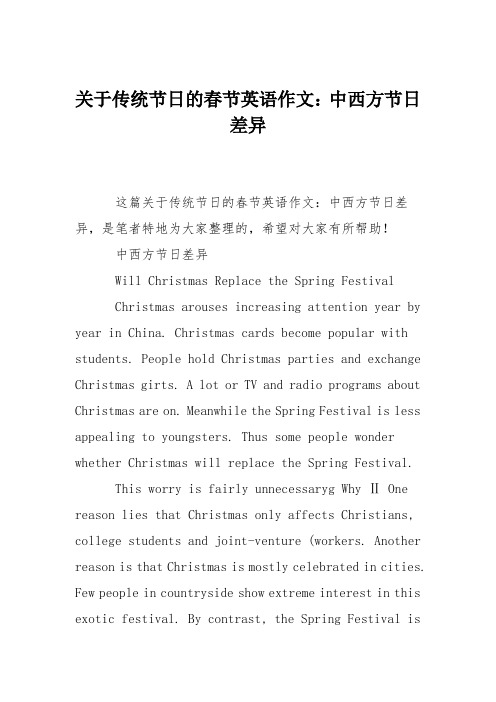
关于传统节日的春节英语作文:中西方节日差异这篇关于传统节日的春节英语作文:中西方节日差异,是笔者特地为大家整理的,希望对大家有所帮助!中西方节日差异Will Christmas Replace the Spring FestivalChristmas arouses increasing attention year by year in China. Christmas cards become popular with students. People hold Christmas parties and exchange Christmas girts. A lot or TV and radio programs about Christmas are on. Meanwhile the Spring Festival is less appealing to youngsters. Thus some people wonder whether Christmas will replace the Spring Festival.This worry is fairly unnecessaryg Why Ⅱ One reason lies that Christmas only affects Christians, college students and joint-venture (workers. Another reason is that Christmas is mostly celebrated in cities. Few people in countryside show extreme interest in this exotic festival. By contrast, the Spring Festival isthe most influential traditional festival in every family.I think, it is natural that with increasing exchanges with the West, a lot of Western holidays have been gradually introduced into China. For us Chinese we should never neglect or even discard our own traditional festivals. For centuries Chinese have observed this traditional holiday to welcome the beginning of a new year. And we will treasure the Spring Festival forever.。
中外节日的英语作文

中外节日的英语作文Title: A Comparison of Chinese and Western Festivals。
Festivals are integral parts of cultures worldwide, reflecting the values, beliefs, and traditions of different societies. In this essay, we will explore and compare some prominent Chinese and Western festivals, highlighting their cultural significance, traditions, and similarities.Firstly, let's delve into Chinese festivals. The Chinese New Year, also known as the Spring Festival, is perhaps the most important festival in Chinese culture. It marks the beginning of the lunar new year and is celebrated with great enthusiasm across China and in Chinese communities around the world. During this time, families gather for reunion dinners, exchange red envelopes containing money (hongbao), and set off fireworks to ward off evil spirits. The festival is also symbolized by the iconic lion and dragon dances, which are believed to bring good luck and prosperity.Another significant Chinese festival is the Mid-Autumn Festival, also known as the Moon Festival. Celebrated on the 15th day of the eighth lunar month, it is a time for families to come together and give thanks for the harvest. One of the central traditions of the Mid-Autumn Festival is the consumption of mooncakes, a dense pastry filled with sweet fillings such as lotus seed paste or red bean paste. Families also gather to admire the full moon and partake in various cultural activities, such as lantern exhibitions and dragon boat races.In contrast, Western festivals often have religious origins but have evolved into secular celebrations over time. One of the most widely celebrated Western festivalsis Christmas, which commemorates the birth of Jesus Christ. While Christmas is a religious holiday for Christians, itis also celebrated by many non-religious individuals as a time for gift-giving, festive decorations, and spending time with loved ones. Traditions associated with Christmas vary across different countries, but common customs include decorating Christmas trees, hanging stockings by thefireplace, and enjoying festive meals.Another notable Western festival is Halloween, which originated from ancient Celtic harvest festivals. Halloween is celebrated on the night of October 31st and is characterized by costume parties, trick-or-treating, and the decoration of homes with spooky motifs like jack-o'-lanterns and cobwebs. It is a time when people embrace the supernatural and indulge in playful scares, often inspired by folklore and horror fiction.Despite their cultural differences, Chinese and Western festivals share some common themes. For instance, both Chinese and Western festivals emphasize the importance of family and community. They provide opportunities for people to come together, strengthen bonds, and create lasting memories. Additionally, many festivals are associated with the changing of seasons and agricultural cycles, reflecting humanity's connection to the natural world and the passage of time.In conclusion, Chinese and Western festivals are richexpressions of cultural heritage, encompassing diverse traditions, customs, and rituals. While they may differ in their origins and practices, they serve similar purposes of fostering unity, celebration, and reflection. By understanding and appreciating the significance of these festivals, we can gain deeper insights into the culturesthat celebrate them and find common ground amidst diversity.。
- 1、下载文档前请自行甄别文档内容的完整性,平台不提供额外的编辑、内容补充、找答案等附加服务。
- 2、"仅部分预览"的文档,不可在线预览部分如存在完整性等问题,可反馈申请退款(可完整预览的文档不适用该条件!)。
- 3、如文档侵犯您的权益,请联系客服反馈,我们会尽快为您处理(人工客服工作时间:9:00-18:30)。
Improper expressions:
1.Spring Festival
2.For there is a long time …, we have to…
3.This phenomenon results in the doubt that whether Christmas will replace…
4.traditional festivals should be paid more attention than foreign festivals.
5.We exchange…, which results in more and more people get interested in foreign festivals.
6.The question that whether Christmas will replace the Spring Festival leads to a heated
discussion in society.
7.There are many people in the western countries celebrate the Spring Festival.
Proper and good expressions:
1.With the tendency towards globalization
2.the Spring Festival should be passed on from generation to generation
3.It seems that some traditional festivals like the Spring Festival are gradually overshadowed
By Christmas.
4.Globalization has encouraged the popularity of Christmas in Chinese.
5.The Spring Festival is an apparent symbol of Chinese culture which is engraved in every
Chinese’s mind.
6.cultural heritage
7.Learning their culture is a must…. We learn English in order to make more people learn
Chinese.
8.festival celebrating has been globalized
9.Some people suspect that the obsession with Christmas will lead us to neglect another
traditional festival--- the Spring Festival.
10.Observing Christmas doesn’t mean abandoning the Spring Festival.
11.the Spring Festival is more than a festival
12.an exotic festival
13.Chinese are celebrating some western festivals, and vice versa.
14.some most celebrated festivals in our country are the essence of our long history and rich
culture.
15.Currently, the word “Christmas” has evolved into a symbol of happiness and gifts.
16.people tend to have an increasing liking for observing western festivals
17.in the circumstances of globalization
Modal
In the course of globalization, western culture has flooded into China at an almost non-stop rate. Along with it come western festivals, the most influential of which is Christmas. As a result of this “culture invasion”, more and more Chinese people, particularly the youth, are abandoning traditional Chinese festivals. There is even a prediction that the Spring Festival will ultimately be replaced by Christmas. However, personally I’m not in favor of this statement, as the Spring Festival is a kind of cultural heritage serving as a spiritual legacy for all of us to cling to, regardless of any hindrance.
First of all, observing Christmas does not mean that the Spring Festival can be neglected. The Spring Festival has its roots in Chinese history, from which it requires its identity and meaning irreplaceable by Christmas. As Christmas stemmed from Western civilization, it can’t easily fit in
with Chinese society, let alone take the place of the Spring Festival.
Secondly, the Spring Festival expresses our true emotions while Christmas cannot. Often, the Spring Festival arouses a feeling of eternal harmony, creates a sense of happiness, and conveys a message of family. However, Christmas goes no further than one night’s pleasure or some fancy presents, which is surely to fade away with passing tide of time and memory.
The Spring Festival is not going to lose its vigor to Christmas, as it’s just like a warm beacon for all the Chinese to gather around to cheer, to dream and to carry on.。
